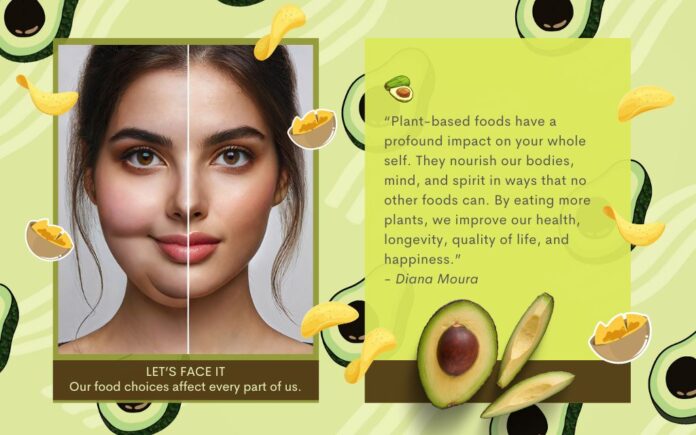“We are what we eat.” This simple but profound statement reflects the idea that the food we consume directly impacts our well-being. It implies that our food influences our physical and mental state, mood, and behaviour. But what does it mean to eat well? And how can we make choices that benefit our physical state and our mental and spiritual well-being, mood, and even the planet?
Food is not just fuel. It is a powerful tool that shapes our bodies and minds. The food we eat can either nourish or harm us, depending on our choices’ quality, quantity, and variety. Our food choices can significantly influence various aspects of our health. Besides providing us with the energy and nutrients we need to function, it also affects the composition of our bodies, mood, quality of our thoughts, sleep patterns, energy, and even consciousness and awareness.
So, which diet can benefit our whole self and overall health?
Plant-based foods have a profound impact on your whole self. They nourish our bodies, mind, and spirit in ways that no other foods can. By eating more plants, we improve our health, longevity, quality of life, and happiness. Eating more plant-based foods can help us achieve a more balanced and harmonious state of being.

Below are some reasons to go green with your plate and why incorporating more plant-based foods into our diet can be beneficial and shape our whole selves:
Plant-based foods nourish our microbiome and boost immunity.
What we eat affects our body shape and weight and the microbiome, which consists of trillions of microorganisms that live in our gut and other organs. Different foods can affect the diversity and composition of the microbiome. The microbiome plays a crucial role in our well-being: it influences our digestion, immunity, metabolism, hormones, and even brain function.
Evidence and research suggest that a varied and balanced plant-based diet, rich in natural and unprocessed grains, nuts, seeds, fruits, vegetables, and fermented foods, can nourish and support our microbiome. Such a diet can promote the growth of beneficial bacteria that have anti-inflammatory and immunomodulatory effects.
Conversely, a diet high in meat, dairy, fat, sugar, and processed foods can increase the abundance of harmful bacteria that produce toxins and cause inflammation, obesity, and an increased risk of various diseases and metabolic disorders. Therefore, it is essential to choose foods that support a healthy and balanced microbiome, which in turn can improve our physical and mental health.
A healthy gut microbiome is crucial for a healthy immune system as it helps regulate inflammation and stimulate immune cells. Plant-based foods can provide essential nutrients, antioxidants, and phytochemicals that help fight infections and diseases and are loaded with anti-inflammatory properties. Including more plant-based foods in our diet will boost our immunity and overall health.
Lowers the risk of several diseases and promotes longevity
Incorporating a plant-based diet into our daily routine can significantly lower the risk of chronic diseases. Research demonstrates that people who eat mostly plant-based diets tend to have a lower body mass index and are less likely to suffer from obesity, diabetes, high blood pressure, high cholesterol, stroke, and heart disease compared to those who consume meat.
Plant-based diets are rich in fibre, complex carbohydrates, vitamins, minerals, and water content from fruits and vegetables, which can help regulate blood sugar, cholesterol, and blood pressure levels. They are also abundant in antioxidants, which combat oxidative stress that can lead to tissue damage and ageing. Furthermore, they contain phytochemicals, which inhibit the growth of cancer cells and prevent DNA mutations, along with other nutrients that can protect against inflammation and oxidative stress that are linked to many chronic diseases.
Therefore, incorporating more plants and eliminating animal products into our diet is a simple and effective way to promote health and longevity and reduce and even reverse certain diseases.
Improves our mental state and mood.
Eating more plant-based food can boost brain function, mental health, and mood. Plant-based diets are associated with lower levels of depression, anxiety, and stress, and can alleviate physical and psychological symptoms such as fatigue, pain, insomnia, irritability, and hopelessness.
This is because plant-based foods contain various compounds that modulate the production and activity of neurotransmitters such as serotonin and dopamine, which regulate mood. Serotonin, which regulates happiness, anxiety, and stress, is mostly produced in the gut, and its levels can be influenced by the food we eat and the bacteria that live in our intestines. Eating more plant-based foods rich in fiber, probiotics, and fermented foods can promote a healthy and diverse gut microbiome and benefit mood.
Additionally, plant-based food provides essential fatty acids that are important for brain health and cognitive function, and can protect the brain from age-related decline and neurodegenerative diseases such as Alzheimer’s and Parkinson’s. Therefore, consuming more plant-based food can positively impact our brain chemistry and mental state.
Improves our sleep patterns and energy.
One of the factors that can impact our sleep patterns is our diet. Eating a healthy plant-based diet can help improve the quality of our sleep by providing essential nutrients that help regulate our circadian rhythm and promote relaxation.
Some of the nutrients that are important for sleep are tryptophan, melatonin, magnesium, and B vitamins. Tryptophan is an amino acid that helps produce melatonin and serotonin, two hormones aiding sleep regulation and mood. Melatonin, found in some plants, can help us fall asleep faster and stay asleep longer. Magnesium is a mineral that helps relax our muscles and nerves and plays a role in melatonin production. B vitamins, particularly B6, are needed to synthesise melatonin and serotonin.
Plant-based foods are rich in all these nutrients and are high in anti-inflammatory properties. Inflammation can cause pain, discomfort, and stress and, consequently, impact our sleep quality, making it more difficult to fall asleep or stay asleep. By being a diet rich in anti-inflammatory properties, a plant-based diet can improve sleep patterns, make us enjoy the benefits of a good night’s rest, and make us feel more energized to tackle the day.

Contributes to a better, kinder, and more sustainable planet.
Eating plant-based foods positively impacts the environment, which in turn positively impacts our behaviour. It enhances our feelings of kindness and compassion towards other living beings and fosters a sense of gratitude and connection with nature. Animal agriculture is a major contributor to greenhouse gas emissions, land use, water use, and pollution.
On the other hand, plant-based diets require fewer resources and produce less waste. Healthier plant-based dietary patterns are associated with better environmental health outcomes than animal-based dietary patterns. By choosing plant-based foods, we show compassion for other living beings and the environment and recognize the abundance and beauty of nature.
This can increase our sense of connection, compassion, kindness, empathy, and gratitude. By choosing plant-based foods, we respect the lives of animals, the environment, and our bodies. We also contribute to a more peaceful and sustainable world.
We can realize that we are what we eat and that we can eat in a way that nourishes ourselves and the world around us.
Impacts our consciousness, awareness, and spiritual well-being.
Certain ancestral practices, like Ayurveda, consider natural, unprocessed plant-based foods to be high-vibrational foods. This means that such foods have a high frequency of energy, which is beneficial not only for our bodies but also for our minds and spiritual selves. Everything around us, including ourselves, is made up of energy, and food is no exception. It has the power to either raise or lower our vibration.
Whole plant-based foods have a higher frequency because they are closer to their natural state and align with nature’s vibrations, rhythms, and cycles. When we consume high-vibrational foods, our vibration also increases, making us feel more balanced and connected to higher states of consciousness and awareness.
This, in turn, unlocks our intuition and creativity, leading to optimal health, balance, and wellness. That is why food plays an important role in our spiritual journey. By choosing plant-based foods, we will also eat more consciously and appreciate more the nourishment we receive from nature. By being conscious about our food choices, we will enjoy our food more, eat less, and avoid overeating, consequently improving our health and well-being.
Background has an impact
We know that choosing what we eat and having the discipline to do so constitutes a luxury that not all people may benefit from (the social, economic and cultural background of each person and country will have a profound effect on how our message comes across); however, studies show that the above benefits are a goal that we should all, at least, consider.
We are what we eat, and food profoundly impacts our health. It is a powerful force that shapes us in many ways beyond just weight and appearance. Food affects our immunity, microbiome, and spiritual well-being, as well as our mind and mood. Our physical and mental well-being is heavily influenced by what we eat.
While a plant-based diet is not an end, it is a means to an end – a happier, healthier, and more balanced life. We become whole when we eat plant-based foods. We become healthy, happy, and balanced, and we become the best version of ourselves.
- Other articles: Plant-Base in Macau






